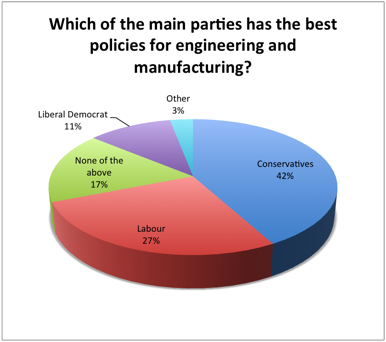
The Conservatives came out ahead in our eve-of-election poll, but as in the real thing, they failed to command a majority. Of the 575 respondents, all of whom replied between Tuesday lunchtime and Thursday evening, 42 per cent opted for the Conservatives; the largest group by some distance, but not past the halfway point for a clear majority. Of course, we are aware that the British electoral system does not work on the basis of proportions of the total voting share, although it might be interesting to see whether the results of the last two General elections had shifted opinions on that since the voting system referendum of 2011.
Last week's poll saw Labour second on 7 per cent, None of the Above on 17 per cent (our equivalent of spoiled ballots, presumably), the Liberal Democrats on 11 per cent, and others on just 3 per cent; 17 people out of that 575. Only a small proportion of those could conceivably have opted for the Democratic Unionist Party, which has ironically been left in a position of disproportionate influence in the real Parliament, but that's the British electoral system for you.
What is interesting is that comparing this poll to the one we ran at the start of the campaign, the proportions for each party were virtually identical. Labour got one more percentage point at the end of the campaign, and the LibDems three points fewer — with all the movement coming from the None of the Above group— but otherwise fifty days of campaigning had no effect on our readership's opinions (although we did get over 200 more respondents). There was certainly no sign of the "Labour surge" that was such a feature of the real poll — perhaps an indication of the age range of working engineers?
This poll is now closed, but with the aftershocks of the election still being felt and many matters still to be resolved, we would welcome more comments.





Glasgow trial explores AR cues for autonomous road safety
They've ploughed into a few vulnerable road users in the past. Making that less likely will make it spectacularly easy to stop the traffic for...